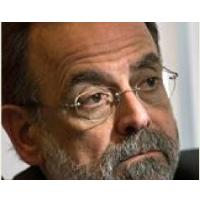Criticism Grows Over Nobel Prize Winner that Gave in to U.S. Bullying over Iraq
 José Bustani (AP Wide World Photos)
José Bustani (AP Wide World Photos)
When the Organization for the Prohibition of Chemical Weapons (OPCW) won the 2013 Nobel Peace Prize, some critics—including the organization’s former leader—sniffed at the decision. As far as its detractors were concerned, the OPCW didn’t deserve such an honor after bending to the United States’ will a decade ago during the run-up to Iraq war.
One of the most vocal critics has been José Bustani, Brazil‘s ambassador to France and former director general of the OPCW. Bustani says the George W. Bush administration pressured foreign diplomats to have him ousted after he tried to conduct chemical weapons inspections inside Iraq before American forces attacked the country in 2003.
Bustani told The New York Times last week that his plans caused “uproar in Washington” and made him a political target. “By the end of December 2001, it became evident that the Americans were serious about getting rid of me,” he stated. “People were telling me, ‘They want your head.’”
He said that Saddam Hussein’s government indicated two years before the U.S. invasion that Iraq was interested in joining the Chemical Weapons Convention, which OPCW oversees. That move would have required Iraq to allow inspectors to visit and verify that no such munitions existed.
“Everybody knew there weren’t any [chemical weapons],” Bustani told the Times. “An inspection would make it obvious there were no weapons to destroy. This would completely nullify the decision to invade.”
So the Bush administration went after Bustani, he claims, with then-U.S. Under Secretary of State John R. Bolton telling him in late 2001 to resign from the OPCW.
Bustani said he refused, prompting the administration to threaten to cut the OPCW’s budget (which the U.S. could do since it funds 22% of it) unless the international body dumped their leader.
The tactic worked, as Bustani was removed as director general the in April 2002.
Bustani’s story has been confirmed by other diplomats, including Celso Lafer, Brazil’s former foreign minister, who said Secretary of State Colin Powell (who had previously praised Bustani’s work) told him in 2002: “I have people in the administration who don’t want Bustani to stay, and my role is to inform you of this,” according to the Times.
Bolton has confirmed his role in pressuring Bustani to quit, but claims the reason was that the OPCW chief was incompetent. “I told him if he left voluntarily we would give him a gracious and dignified exit,” Bolton told the Times.
Bolton’s office had circulated documents charging Bustani with abrasive behavior and failing to consult with the U.S. and other nations about “ill-considered initiatives” that he had allegedly undertaken.
According to the Times, both Bustani and senior officials in the U.S. and Brazil say the real reason the Bush administration forced Bustani out was that it saw him as an obstacle to its plans to invade Iraq.
“My view is that the neocons wanted the freedom to act,” said Brazil’s Lafer, with “particularly John Bolton and Donald Rumsfeld wanting the head of Bustani.”
The dismissal of Bustani is why some experts today objected to the OPCW’s honoring by the Nobel Committee.
“Under the Bush administration, the OPCW and its leadership was attacked and undermined because it dared to use inspections rather than unsubstantiated claims to determine the existence of these dangerous arsenals and peaceful means rather than war to eliminate them,” Middle East scholar Stephen Zunes said in a statement released by the Institute for Public Accuracy.
“I think the very fact that we do have the OPCW beginning the process of disarming Syria’s chemical weapons, whereas we don’t have such activity in Israel and Egypt, is indicative that even the best international organizations are limited by what the great powers can say they can or cannot do,” he added in an interview with Democracy Now!
-Noel Brinkerhoff
To Learn More:
Fired for Standing in Way of Iraq War: Ousted Director of Nobel-Winning OPCW Speaks Out (by Sarah Lazare, Common Dreams)
To Ousted Boss, Arms Watchdog Was Seen as an Obstacle in Iraq (by Marlise Simons, New York Times)
2013 Nobel Peace Prize Winner Fails to Challenge US Power: Critics (by Jacob Chamberlain, Common Dreams)
U.N. Inspectors Flee Syria…Obama Pulls a George W. Bush in Iraq (by Matt Bewig, AllGov)
Bush Invaded Iraq on a Mission from God (by David Wallechinsky, AllGov)
- Top Stories
- Unusual News
- Where is the Money Going?
- Controversies
- U.S. and the World
- Appointments and Resignations
- Latest News
- Trump Orders ICE and Border Patrol to Kill More Protestors
- Trump Renames National Football League National Trump League
- Trump to Stop Deportations If…
- Trump Denounces World Series
- What If China Invaded the United States?






Comments